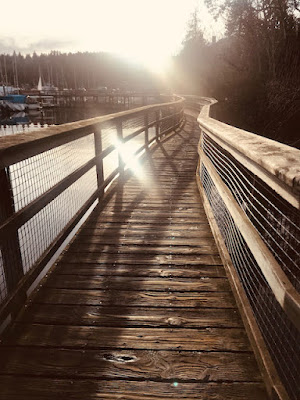Aminatta Forna's novel starts with a Wolfer killing the last pair of wolves in Greenhampton, Massachusetts in 1834. One of the key characters, Jean, carries on that theme by studying coyotes in upstate New York in the 21st Century as well as urban foxes in London. But this is secondary, though related to the main theme and main character Attila.
Attila describes his job working in crisis zones around the world.
"'I specialise in trauma, among civilian populations principally,' said Attila. 'Much of my work is as you would imagine. Teams of us go in, some to count the dead, others to trace the living and return them to where they should be or send them somewhere else. I work with the survivors. My job is less to fix the damage than to catalogue the extent of it."
'What happens then?'
'After us? More reconstruction. The aid agencies, the people who have won the contracts to fix the roads, mend the dams, repair the bridges.'
'I meant to the victims.'
'We file our reports, they can run to thousands of pages. Sometimes a perpetrator or two is imprisoned in The Hague. A few of the survivors will be called as witnesses and have their moment in court. They get to see some general or president or warlord whose name they have heard but who they've never laid eyes on put behind bars. They go there wanting to face the person who tortured them, but that never happens, the system doesn't work like that. The lawyers argue about chains of command, utmost responsibility. Those words don't mean anything to the woman whose daughter was taken away or who's son's bones turned up in a ditch he had to dig himself.' Attila shrugged. 'While all that's happening, somewhere in the world somebody else gets ready to go to war.'
'Wow!' Jean exhaled, not knowing what to say next. (p. 118)
All that proceeds the next paragraph:
Attila gave a small wry smile. 'I'm not being cynical, just realistic. War is in the blood of humans. The kind of people who torture and rape during war, they're always among us, every time you walk own a busy street you're passing killers waiting to kill. War gives them license. We tell ourselves people are ordinarily good, but where is the proof of that? There are no ordinarily good people, just a lot of people who've never been offered the opportunity to be anything else. As for the rest, the followers and foot soldiers - well you can't imprison half a nation. For them and for everyone else life carries on, only not quite as before."(118)
I should add that Attila is a Ghanian psychiatrist who's in London to present a paper at a conference. It's there that Jean bumps into him (literally) while she's jogging over the Waterloo Bridge observing one of her foxes weaving unnoticed through the crowd.
He goes on, and I had to think of all the white supremacists that Trump has unleashed:
"There was no big secret to war, Attila thought. There would always be people who relished violence, all they ever needed was a leader and an opportunity. If someone could unite the gang members of New York or Chicago or London, they could take over their respective cities if that person was the president they could take over the country. A lot could be achieved by offering young men power and sex."
The book was published in 2018. Usually books take years to be written, edited, and published, so the odds are good it was started before Trump was seen as a viable candidate, though passages like this could have been edited closer to the publication date.
The chapters are titled Sunday, Monday, Tuesday, etc. as we follow Attila during the two weeks or so he's in London for the conference. He and Jean run into each other a couple of times and then team up after Attila goes to see his niece and a neighbor tells him that the niece and her son were taken by immigration. He tracks down he niece in a hospital bed who was let go because it was a mistaken identity (well, actually, an unscrupulous landlord who reported her as illegal so he could get her out of the apartment and raise the rent), but the boy, who'd been put in a foster home, had run away. Jean, who's been mapping out sections of the neighborhoods to keep track of her foxes, offers to help find the boy. Jean has also enlisted the help of night workers - street cleaners, doormen, restaurant workers, many of them Africans) to report fox sightings to her. She recruits them to help look for the boy.
After Jean gets ambushed on a talk radio show by the host who believes urban foxes should all be killed - Attila gives her this advice:
"Attila laughed. 'Do you know what a diplomat I once worked with told me? That in government they are taught to treat the electorate like six-year-olds. If you ask a member of the voting public a question on any subject most of us can only come up with three words we identify with that thing The words depend on what our concerns are or what the papers tell us our concerns are. . .
As a retired public administration professor, I assure you I never taught my students to treat the public like six year olds, but then few government employees have public administration degrees. And thinking about the three words can be useful.
There are other events and characters in the week and a half that's covered in the book. And some flashbacks to prior events. How Jean's marriage fell apart in the States. Rosie, an old lover of Attila's who's got Alzheimers and is living in a nursing home and Emmanuel, who's bonded with Rosie, through his job at the home as a caregiver. Attila's dead wife Marysa also hovers over the interwoven plot lines.
The flashbacks take us back to war zones - either those between humans and wolves and coyotes, or between humans and humans - to give us background on Jean and Attila.
Attila muses about war frequently.
"His mind was on the mission ahead which was not the kind for which he cared a seminar on frontline training for the military. Young men giving their bodies and their minds to battle sent by middle-aged men who only ever handled a gun on their weekend duck shoots and men like Attila tasked with the job of trying to keep the young men sane while what they were being asked to do was an insanity itself."
There's also a fair amount of discussion about psychiatry. Here's one example.
“In Attila’s second year of medical school the psychiatric establishment was rocked by an incendiary laid treacherously by one of their own a psychologist called David Rosenhan, Rosenhan had attended a lecture by the Scottish psychiatrist Ronald Laing a hard-drinking radical who liked to irritate his peers by challenging psychiatric shibboleths among them the notion that psychiatric diagnoses were objective and could be compared with medical ones Rosenhan wondered if there were any empirical way to test this assertion and decided to conduct his own experiments He recruited a group of six volunteers including (alongside several medical professionals) a painter and a housewife and himself as the seventh Each volunteer was detailed to ring one of several psychiatric hospitals and to request an appointment, to which they presented themselves unwashed and unshaved. They were to describe hearing voices. Nothing too dramatic and always the same words, ‘Empty’, ‘Hollow’, ‘Thud’. All but one of the volunteers was admitted, after which the six, in accordance with their instructions, behaved perfectly normally and told staff the voices had gone away. Nevertheless the participants were held for an average of nineteen days, and one poor soul was kept inside for fifty-two. When eventually they were discharged each of the patients was described not as sane or cured but ‘in remission’. In every case the only people who suspected the volunteers of being perfectly sane frauds were other patients.” (pp 229-230)
I'm close to the end of the book and finding it fascinating, in no small part because many of the characters are part of an African immigrant underclass in London, taking on low level service jobs. It's a part of London I'm much less familiar with.
"Aminatta Forna was born in Scotland, raised in Sierra Leone and Great Britain and spent periods of her childhood in Iran, Thailand and Zambia. She is the award-winning author of the novels Happiness, The Hired Man, The Memory of Love and Ancestor Stones, and a memoir The Devil that Danced on the Water, and the forthcoming essay collection, The Window Seat: Notes from a Life in Motion."
As I near the final pages, I'd say the book is about the human need to control. To control the world, to control nature, to control others. This is demonstrate by how psychiatrists try to control mental illness by categorizing and then treating it. By how people try to control the uncontrollable by killing it - culling urban foxes, refusing to listen to Jean who has been studying the fox behavior and who says that just killing them won't work.
From Ayo, one of the immigrants in Jean's team of fox watchers:
"Cannot become rich from [foxes], cannot control them, not even kill them. That's why the foxes make some people angry. The problem with those people is that they themselves have forgotten they are alive."
A career diplomat echoes that theme. He's holding a snow globe given him long ago by his daughter:
"'This is how most people want to live.' He put his hand out for the [snow] globe and Attila handed it to him. Quell held it up to the light. 'They want to be safe, they want to be comfortable. They want to believe that they are in control of their lives, and they want that thing we call freedom. It all comes at a price, but don't you dare mention that. People want choices without consequences. And we give it to them, fools that we are. We are the "somebody" people who have no bloody intention of doing anything themselves mean when they say somebody must do something. I blame books, films, all that nonsense.'"



































